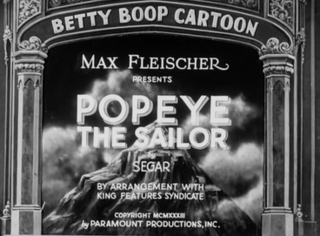Related Research Articles

Snow-White is a 1933 American animated short in the Betty Boop series from Max Fleischer's Fleischer Studios. Dave Fleischer was credited as director, although virtually all the animation was done by Roland Crandall, who received the opportunity to make Snow-White on his own as a reward for his several years of devotion to the Fleischer studio. The resulting film, which took six months to complete, is considered both Crandall's masterwork and an important milestone of the Golden age of American animation.

Betty Boop is an animated cartoon character designed by Grim Natwick at the request of Dave Fleischer. She originally appeared in the Talkartoon and Betty Boop film series, which were produced by Fleischer Studios and released by Paramount Pictures. She was featured in 90 theatrical cartoons between 1930 and 1939. She has also been featured in comic strips and mass merchandising.
Myron Waldman was an American animator, best known for his work at Fleischer Studios.

Mae Questel was an American actress. She was best known for providing the voices for the animated characters Betty Boop, Olive Oyl and numerous others.

The Old Man of the Mountain is a 1933 American pre-Code live-action/animated short in the Betty Boop series, produced by Fleischer Studios. Featuring music by Cab Calloway and his Orchestra, the short was originally released to theaters on August 4, 1933, by Paramount Pictures. Calloway voices all of the characters in the cartoon save for Betty herself. Calloway and his orchestra also perform all of the music in the cartoon, including two songs Calloway co-wrote.

Popeye the Sailor is a 1933 animated short produced by Fleischer Studios and distributed by Paramount Publix Corporation. While billed as a Betty Boop cartoon, it was produced as a vehicle for Popeye in his debut animated appearance.
Betty Boop's Bamboo Isle is a 1932 Fleischer Studios Betty Boop animated short, directed by Dave Fleischer.
Swim Or Sink is a 1932 Fleischer Studios animated short film directed by Dave Fleischer and starring Betty Boop, Koko the Clown, and Bimbo. It was reissued under the titles S.O.S.

Musical Mountaineers is a 1939 Fleischer Studios animated short film starring Betty Boop.
I Heard is a 1933 Pre-Code Fleischer Studios animated short film starring Betty Boop, and featuring Koko the Clown and Bimbo. The cartoon features music by and a special guest appearance from jazz musician Don Redman and his Orchestra.
Betty Boop's Birthday Party is a 1933 Fleischer Studio animated short film, starring Betty Boop and featuring Koko the Clown and Bimbo.
Mother Goose Land is a 1933 Fleischer Studios animated short film starring Betty Boop.
Betty Boop's May Party is a 1933 Fleischer Studios animated short film starring Betty Boop, and featuring Koko the Clown and Bimbo.
Betty Boop and Little Jimmy is a 1936 Fleischer Studio animated short film, starring Betty Boop and featuring newspaper comic strip character Little Jimmy.

Christmas Comes But Once a Year is a 1936 animated short produced by Fleischer Studios and released on December 4, 1936 by Paramount Pictures. It is part of the Color Classics series. The cartoon features Professor Grampy, a character from the Betty Boop series; this is the character's only appearance without Betty. An edited version was featured during the Pee-wee's Playhouse Christmas Special in 1988, as the featured short shown by the King of Cartoons.
Clara Rothbart known professionally as Bonnie Poe was an American actress, best known for providing the voice for the Fleischer Studios animated character Betty Boop beginning in 1933, starting with the Popeye the Sailor series and featuring in a dozen cartoons. She voiced her in a live-action segment on the special Hollywood on Parade No. A-8, performing a skit with Bela Lugosi providing a portrayal of Count Dracula.
Boop-Oop-a-Doop is an animated short film created by Fleischer Studios on January 16, 1932, as part of the Talkartoon series.
Jack and the Beanstalk is a 1931 Fleischer Studios Talkartoon animated short film starring Bimbo and Betty Boop.
Dizzy Red Riding Hood is a 1931 Pre-Code Fleischer Studios Talkartoon animated short film starring Betty Boop.

Minnie the Moocher is a 1932 Betty Boop cartoon produced by Fleischer Studios and released by Paramount Pictures.
References
- ↑ Scott, Keith (2022). Cartoon Voices from the Golden Age, 1930-70. BearManor Media. p. 335. ISBN 979-8-88771-010-5.
- ↑ Lenburg, Jeff (1999). The Encyclopedia of Animated Cartoons. Checkmark Books. pp. 54–56. ISBN 0-8160-3831-7 . Retrieved June 6, 2020.